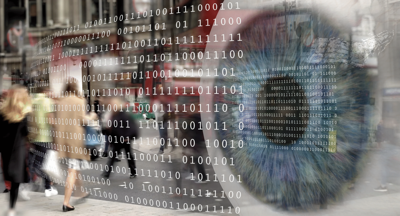
(Image via Canva)
The federal expansion of immigrant surveillance is increasing political targeting, identity theft and data breach risks for all Americans.
The second Trump administration has raised alarm from experts that government use of personal data under the banner of fighting fraud, stopping crime or detecting undocumented immigrants — including an immigrant name and address data-sharing agreement between the Department of Homeland Security (DHS) and the Internal Revenue Service (IRS) — could threaten the privacy rights of residents nationwide, including citizens.
Last May, a federal judge denied a preliminary injunction against such data-sharing between DHS, the IRS and Immigrant and Customs Enforcement (ICE); this effectively greenlit the first-ever time the IRS formally agreed to provide taxpayer information for immigration enforcement under a memorandum of understanding.
“These practices go far beyond just privacy violations. They actively erode trust in public institutions,” said Nicole Alvarez, senior analyst for technology policy at the Center for American Progress, at a Friday, September 5 American Community Media briefing. “When people share their personal information with a government agency, there is an expectation — sometimes rooted in law, sometimes just in practice — that the information will only be used for that specific purpose.”
A ‘digital watchtower’
Alvarez warned that the Department of Government Efficiency’s pushes to centralize raw data currently siloed among different agencies is fueling a “digital watchtower, which is a rapidly expanding system of surveillance that threatens not only the immigrant communities currently being targeted by this administration, but the privacy rights of all Americans.”
Since Trump’s March 20 executive order eliminating “information silos” and urging inter-agency data sharing, several lawsuits have been filed alleging that one unified federal database would violate the Privacy Act of 1974, the main law governing how federal agencies handle personal data by limiting data-sharing to the purpose for which it was given, ensuring no single part of the government can access all records of a person’s identity at once.
“The problem with the Privacy Act is that it has simply not kept up with the times,” said Alvarez. “It was written before the internet existed, before mass data storage, before agencies could link massive databases. Today, the law offers very limited accountability when data is reused, repurposed or shared across agencies in ways that were never expected.”
Last April, in response to the immigrant data-sharing memorandum between the IRS and DHS, Trump-appointed IRS Commissioner Melanie Krouse announced her resignation, citing privacy violation concerns.
“When people see the government repurpose their information in ways that feel retaliatory or unpredictable, they begin to opt out. They may avoid filing taxes. They may forego needed medical care for themselves or their children,” explained Alvarez.
“And when people disengage from public systems, those systems inherently become weaker, more unfair and less democratic,” she continued. “Ironically, it undermines long-term goals like fraud prevention and civic participation.”
“Surveillance of immigrants is just the starting point. History shows us that tools created for surveillance rarely stay in their original box,” she added. “Once these systems and practices are in place, it’s easy for the scope to quietly expand, which leaves everyone vulnerable, not just the groups that the administration claims to be targeting in that moment.”
‘A great chilling effect’
A 2022 report published by the Georgetown Center on Privacy & Technology, American Dragnet, found that ICE already uses digital surveillance to monitor the lives of most people in the U.S.
According to the report, ICE has scanned the driver’s license photos of one in three adults; has access to the driver’s license data of three in four adults; and could locate three in four adults through their utility records.
A 2024 Georgetown report following this research, Raiding the Genome, involved the first in-depth analysis of the drastic expansion of a DHS program to take DNA samples from thousands of people daily for criminal policing and prosecution, adding the samples to a forensic federal policing database called CODIS.
The report found that profiles were added regardless of whether individuals had committed a crime or been charged with one.
Emerald Tse, associate at the Georgetown Center, said “Law enforcement across the country can search the profiles in this database to identify people who have committed crimes in the past. But we also found that the federal government has defended DNA collection from immigrants as a way to predict who might commit crimes in the future.”
Between 2008 and 2021, ICE surveillance technology spending ballooned from $71 million to $388 million a year, totalling $2.8 billion spent over the past 14 years.
The surveillance industry is only continuing to grow.
In her keynote during the annual Border Security Expo last April, DHS Secretary Kristi Noem called for more government data-exchange partnerships with private tech companies, particularly to monitor immigrants’ social media activity.
In 2019, during the first Trump administration, the U.S. State Department began requiring nearly all visa applicants — immigrant and nonimmigrant — to provide all the social media usernames they had used over the previous five years. This policy continued under Biden.
“There’s a great chilling effect … inhibiting freedom of speech,” said Sophia Cope, senior staff attorney with the Electronic Frontier Foundation (EFF). “Citizens who might be the colleagues or the family members or friends of the visa applicants themselves might not want to speak out publicly on certain things for fear that they’re either going to affect their loved one’s ability to even get a visa, or that they themselves are going to be caught up in the surveillance.”
Last March, U.S. Citizenship and Immigration Services (USCIS) proposed expanding this social media surveillance beyond visa applicants to include those of other statuses, including asylum seekers and citizenship applicants.
In 2017, EFF and the American Civil Liberties Union filed a lawsuit against ICE and Customs and Border Protection (CBP) on behalf of 11 travelers — 10 U.S. citizens and one lawful permanent resident — whose electronic devices were searched at the border without a warrant.
In deposition testimony, ICE and CBP officials “readily admitted that they will seek to search the device of a traveler, not when the traveler is the target of the investigation or is under suspicion, but because they think that traveler might have valuable information on someone else that they’re associated with,” Cope explained.
“The current administration has already targeted and detained people regardless of their immigration status, and that it has already used its surveillance tools available for immigration enforcement to suppress free speech and punish political dissents,” added Tse. “This surveillance puts everyone at risk, not just immigrants.”











(0) comments
Welcome to the discussion.
Log In
Keep it Clean. Please avoid obscene, vulgar, lewd, racist or sexually-oriented language.
PLEASE TURN OFF YOUR CAPS LOCK.
Don't Threaten. Threats of harming another person will not be tolerated.
Be Truthful. Don't knowingly lie about anyone or anything.
Be Nice. No racism, sexism or any sort of -ism that is degrading to another person.
Be Proactive. Use the 'Report' link on each comment to let us know of abusive posts.
Share with Us. We'd love to hear eyewitness accounts, the history behind an article.